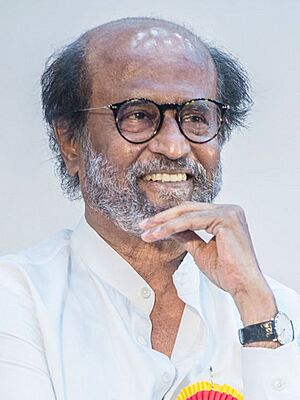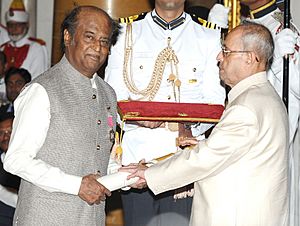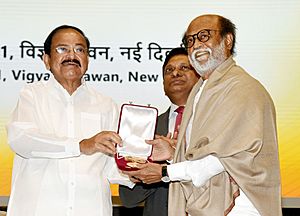Rajinikanth facts for kids
Quick facts for kids
Rajinikanth
|
|
|---|---|

Rajinikanth in 2019
|
|
| Born |
Shivaji Rao Gaikwad
12 December 1950 Bangalore, Mysore State, India
|
| Alma mater | Adyar Film Institute |
| Occupation |
|
| Years active | 1975–present |
|
Works
|
Full list |
| Spouse(s) |
Latha Rajinikanth
(m. 1981) |
| Children | |
| Relatives | See Rajinikanth family |
| Awards | Dadasaheb Phalke Award (2019) NTR National Award (2016) Kalaimamani (1984) (See full list) |
| Honours | Padma Vibhushan (2016) Padma Bhushan (2000) |
Shivaji Rao Gaikwad (born 12 December 1950), known professionally as Rajinikanth, is a famous Indian actor. He mostly works in Tamil cinema. Over five decades, he has acted in 170 films. These films are in many languages like Tamil, Hindi, Telugu, Kannada, Bengali, and Malayalam.
Many people consider him one of the most successful and popular actors in Indian cinema. He is known for his unique style and memorable lines in movies. He has a huge fan base. The Government of India has given him high honors. These include the Padma Bhushan in 2000 and the Padma Vibhushan in 2016. These are India's third and second highest civilian awards. In 2019, he received the Dadasaheb Phalke Award. This is the highest Indian award for cinema. He has also won many other film awards. These include one National Film Award and seven Tamil Nadu State Film Awards.
Rajinikanth started his acting journey in 1975. His first film was the Tamil drama Apoorva Raagangal. At first, he often played characters who were against the main hero. Later, he started playing positive roles. His roles in films like Bhuvana Oru Kelvi Kuri (1977) and Mullum Malarum (1978) were highly praised. By the end of the 1970s, he had worked in all South Indian film industries. He became a big star in Tamil cinema.
He then played two roles in the action film Billa (1980). This film was a remake of the Hindi movie Don. Billa was a huge success and made him an action hero. He even played three different roles in Moondru Mugam (1982). The next year, he made his Hindi film debut in Andhaa Kaanoon (1983). This film was also very popular. In the late 1980s, he starred in many successful films. These include Padikkadavan (1985) and Mr. Bharath (1986).
Contents
Becoming a Superstar: 1990s and 2000s
In 1991, Rajinikanth starred in the Tamil film Thalapathi. His performance in this movie was highly praised. He worked with director Suresh Krissna on many films. These include Annaamalai (1992) and Baashha (1995). Baashha became one of the biggest commercial successes of his career. It was the highest-earning Tamil film for many years.
Other successful films from this period include Mannan (1992) and Muthu (1995). Muthu was a huge hit. It was even dubbed into Japanese and became very popular in Japan. This made Rajinikanth famous there. His film Padayappa (1999) also became a blockbuster.
After a short break, he returned to acting in 2005 with the film Chandramukhi. This movie was a big success. His next film, Sivaji (2007), was a milestone. It was one of the first Indian films to earn a lot of money, joining the "100 Crore Club."
In 2010, he played a scientist and a robot in the science fiction film Enthiran. This film was one of the most expensive Indian movies ever made. It became one of the highest-earning Indian films of all time. Its sequel, 2.0 (2018), was also a huge success. In 2023, his film Jailer earned over ₹600 crore (a very large amount of money). This made him the only actor with two films that earned over ₹500 crore in the industry.
Asiaweek magazine named Rajinikanth one of the most influential people in South Asia. Forbes India also called him the most influential Indian in 2010. In 2024, Rajinikanth received the UAE Golden Visa.
Early Life and Background
Rajinikanth was born as Shivaji Rao Gaikwad on 12 December 1950. He was born into a Marathi family in Bangalore, which was then part of Mysore State. His mother was a homemaker, and his father was a police officer. He is the youngest of four children.
When he was nine, his mother passed away. He went to primary school in Bangalore. As a child, he enjoyed sports like cricket, football, and basketball. His brother enrolled him in the Ramakrishna Math, a Hindu monastery. There, he learned about ancient texts and history. This helped him develop a strong sense of spirituality. He also started acting in plays at the monastery. His acting skills were noticed even then.
After school, Rajinikanth worked several jobs. He was a coolie (a laborer) and later a bus conductor for the Bangalore Transport Service. He continued acting in plays. He decided to join the Madras Film Institute to study acting. His friend, Raj Bahadur, supported him financially during this time.
At the institute, he was noticed by film director K. Balachander. Balachander gave him the stage name "Rajinikanth." This was to avoid confusion with another famous actor, Sivaji Ganesan. The director also advised him to learn to speak Tamil, which Rajinikanth quickly did.
Acting Career Highlights
Starting Out: 1970s Films
Rajinikanth's first film was Apoorva Raagangal (1975). He had a small role in it. The film was praised and won three National Film Awards. A newspaper review said he was "dignified and impressive." His next film was Katha Sangama (1976).
In Moondru Mudichu, he played a more important role. His unique way of flipping a cigarette in this film became very popular. He often played villain roles in his early films. In 1977, he got his first lead role in the Telugu film Chilakamma Cheppindi. Director S. P. Muthuraman then gave him a positive role in Bhuvana Oru Kelvi Kuri (1977). This film's success led them to work together on many more movies.
Becoming a Star: 1978-1989
In 1978, Rajinikanth had 20 films released in Tamil, Telugu, and Kannada. His film Bairavi was the first Tamil film where he was the only hero. It was for this film that he earned the nickname "Superstar." His movie Mullum Malarum was highly praised. It won the Filmfare Award for Best Tamil Film.
Rajinikanth was inspired by Hindi film star Amitabh Bachchan. He often played roles that were similar to Bachchan's in Tamil remakes of his films. One of his most successful remakes was Billa (1980). This film was a big commercial success and proved he was a full-fledged hero.
In 1981, he starred in Thillu Mullu, his first full-length comedy. His mentor, K. Balachander, encouraged him to do non-action roles. In 1982, he played three different roles in Moondru Mugam. By 1983, he was a very popular actor across South India. He made his first Bollywood film, Andhaa Kaanoon, which was a blockbuster. In 1984, his performance in Nallavanuku Nallavan won him his first Filmfare Award for Best Actor – Tamil. In 1985, he played the Hindu saint Raghavendra Swami in his 100th film, Sri Raghavendra.
In the late 1980s, he continued to star in many successful films. In 1988, he appeared in his only American film, Bloodstone. He played an English-speaking Indian taxi driver. He ended the decade with films like Raja Chinna Roja (1989). This was the first Indian film to mix live action and animation.
Continued Success: 1990-2010
The 1990s started with the hit film Panakkaran (1990). In 1991, he worked with director Mani Ratnam on Thalapathi. This film was inspired by the ancient Indian epic Mahabharata. It was praised by critics and was very successful.
His film Annamalai (1992) was the first to feature the "Superstar" graphic title card. He also wrote his first screenplay for the film Valli (1993). In 1995, he starred in Baashha, which became a huge hit and made him even more popular. His film Muthu (1995) was also a big success. It was the first Tamil film to be dubbed into Japanese.
In 1999, his film Padayappa became a blockbuster. After a short break, he returned with Baba in 2002. Two years later, he starred in Chandramukhi (2005). This film was very successful and became the longest-running Tamil film.
In 2007, he starred in Sivaji. This film was a massive hit and earned a lot of money. He then worked with director Shankar again for the science fiction film Enthiran (2010). This film was released as the most expensive Indian film ever made at the time. It became an "All Time Blockbuster."
Recent Films and Achievements: 2011-Present
In 2011, Rajinikanth faced some health issues. He received treatment and recovered. In 2014, he starred in Kochadaiiyaan. This was India's first motion capture film. This made him the first Indian actor to appear in four different types of cinema: black-and-white, color, 3D, and motion capture. His film Lingaa was released on his birthday in 2014.
After a two-year break, Rajinikanth returned with Kabali in 2016. This film became the highest-earning Tamil film of that year. In 2018, he starred in Kaala. He also appeared in S. Shankar's 2.0, reprising his roles from Enthiran. 2.0 was a huge commercial success.
In 2019, Rajinikanth starred in Petta. His performance in this film was highly praised. His film Darbar was released in 2020. In 2021, his film Annaatthe was a commercial success.
His 169th film, Jailer, was released on 10 August 2023. He played a retired jailer in the film. It received very positive reviews and was a huge commercial success. In 2024, he appeared in the action drama film Vettaiyan. He also made a guest appearance in his daughter's film Lal Salaam.
Upcoming Projects
Rajinikanth's 171st film is titled Coolie. It is directed by Lokesh Kanagaraj. Filming for Coolie began in July 2024. The film is planned for release in mid-2025. He is also currently working on Jailer 2.
Personal Life
Family and Beliefs
Rajinikanth married Latha Rangachari on 26 February 1981. They have two daughters, Aishwarya and Soundarya. He has four grandchildren.
Rajinikanth is a practicing Hindu and believes strongly in spirituality. He practices yoga and meditation. He often visits major Hindu temples before his films are released. He also sometimes goes on pilgrimages to the Himalayas.
Helping Others
Many of Rajinikanth's charitable activities are not widely known because he prefers to keep them private. In the 1980s, he helped campaign for corneal transplantation (eye donation) through TV and public speeches. In 2011, he supported an anti-corruption movement. He offered his wedding hall for free for people to hold their protests. He also provided lodging for sanitary workers after the 2015 South India floods. Rajinikanth's fan clubs often organize blood donation and eye donation camps. They also distribute food on his birthday.
Filmography
Rajinikanth has appeared in over 170 films. Most of them are in Tamil cinema. He started his career playing supporting roles and villains. Later, he became a lead actor. He has also worked in Hindi, Telugu, Kannada, Malayalam, and Bengali films. He even appeared in one English film.
Awards and Honors

Rajinikanth has received many awards for his films, especially in Tamil. He won his first and only Filmfare Award for Best Tamil Actor in 1984 for Nallavanuku Nallavan. He has also received six Tamil Nadu State Film Awards. He has won many awards from Cinema Express and Filmfans' Association.
The Government of Tamil Nadu honored him with the Kalaimamani award in 1984. In 1995, he received the Kalaichelvam Award. The Government of India honored him with the Padma Bhushan in 2000 and the Padma Vibhushan in 2016. In 2007, NDTV named him the Indian Entertainer of the Year. The Government of Maharashtra gave him the Raj Kapoor Award the same year. He also received the Chevalier Sivaji Ganesan Award for Excellence in Indian Cinema.

Forbes India named him the most influential Indian in 2010. In 2011, he received the Entertainer of the Decade Award from NDTV. In December 2013, NDTV honored him as one of the "25 Greatest Global Living Legends." In 2014, he received the IFFI Indian Film Personality of the Year Award. Rajinikanth received the Dadasaheb Phalke Award at the 67th National Film Awards ceremony on 25 October 2021.
See also
 In Spanish: Rajinikanth para niños
In Spanish: Rajinikanth para niños
- Rajinikanth facts
 | Percy Lavon Julian |
 | Katherine Johnson |
 | George Washington Carver |
 | Annie Easley |

